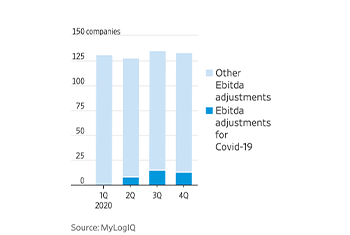A Democratic proposal to tie taxes for big companies more closely to their financial accounting could distort public financial disclosures, inject politics into accounting rule-making and complicate financial reporting for large companies, according to accounting and tax experts and investors. The proposal, which passed the House by a seven-vote margin on Friday, is intended to… Continue reading Minimum Tax Proposal Would Create Complications for Investors and Companies, Tax Experts Say
Tag: GAAP
Companies Put the Best Face on Covid-19’s Financial Impact
After its business was hit by the pandemic, retailer Ulta Beauty Inc. ULTA -0.82% appears to have used some accounting cosmetics to add a gloss to its financial results.
Operating income at the once-fast-growing chain, which temporarily closed stores during the health crisis, plummeted to $13 million for the nine months through October, a fraction of the $613 million earned in the same period in 2019. Two coronavirus-related items affected the math: a $40 million impairment charge for the value of some stores that reduced the operating income, and $51 million of federal tax credits that increased it.
Ulta also reported a much healthier $98 million “adjusted operating income.” This tally, designed to strip out one-time items, added back the $40 million impairment cost, which boosted the adjusted number, but didn’t take off the $51 million of federal aid. If that aid had been removed, the adjusted-operating-income number would have been half of what the company reported.
…Roughly one-quarter of S&P 500 companies last year reported an adjusted figure for earnings before interest, tax, depreciation and amortization, or Ebitda. But only about one in 10 of those companies disclosed adjusted Ebitda because of Covid-19 during the three quarters through December 2020, according to data provider MyLogIQ.
U.S. Corporations Increasingly Adjust to Mind the GAAP
A financial obfuscation of the dot-com era is making a comeback: Hundreds of U.S. companies are trumpeting adjusted net income, adjusted sales and “adjusted Ebitda.” These adjusted measures paint a rosier picture of corporate earnings. Without them, third-quarter earnings per share fell 13% for the biggest U.S. companies, according to Deutsche Bank research, instead of falling 0.1%… Continue reading U.S. Corporations Increasingly Adjust to Mind the GAAP


